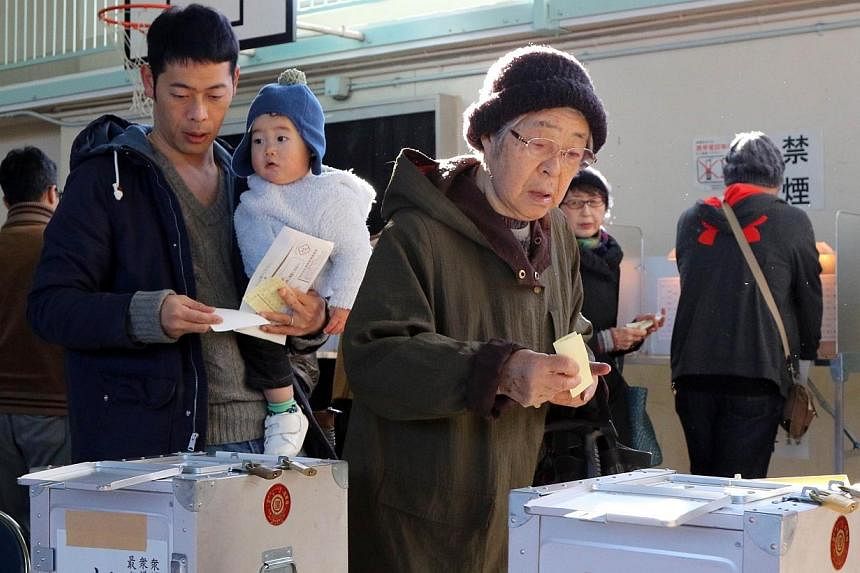Millions of Japanese are braving wintry weather to vote in a snap election on Sunday that will enable Prime Minister Shinzo Abe to claim a fresh mandate for his reflationary policies to revive Japan's long-stagnant economy.
As at 2 pm local time (1pm Singapore time), voter turnout was 22.66 per cent, almost 5 percentage points lower than the turnout at the same time in 2012, said the interior ministry.
But early voting - which was completed by Saturday - was up 9.25 per cent from the previous poll, according to the government.
Media exit polls, which have proved reliable in the past, will come out at 8 pm (7pm Singapore time).
At stake are 475 seats in Japan's Lower House of Parliament.
Some 104 million Japanese are eligible to vote at 48,600 polling stations around the country. Of the total number of voters, several million had opted to cast absentee ballots before Sunday.
This snap general election was called by Prime Minister Shinzo Abe and comes barely two years after the last one in 2012.
Mr Abe has characterised this election as a referendum on his "Abenomics" growth policies that many people believe to be faltering.
"Abenomics" involves a mixture of loose monetary policy, government spending and structural reforms to help Japan come out of 15 years of deflation and move down the road to economic recovery.
But most political watchers believe that Mr Abe's real aim is to give himself another four years at the helm.
Opinion surveys in the past week suggest that his Liberal Democratic Party (LDP) is likely to win the election hands down.
The two-party coalition consisting of the LDP and its junior partner Komeito is tipped to win as many as two-thirds of the seats in the Lower House.
A minimum of 317 seats are needed for a two-thirds majority.
By itself, the LDP may be able to garner around 300 seats.
But the surveys also noted that when asked which party or candidate they will vote for, some 40 per cent of voters said they had not yet made up their minds.
Every voter is allowed two ballots: one ballot for a candidate of his choice in 295 single-seat wards and another ballot for a political party to fill 180 proportional representational seats divided into 11 blocs.
Close to 1,200 candidates are standing in this election, most of them in single-seat wards. Of the total number of candidates, 198 are women.
Most candidates standing in single-seat wards are also listed in their party's proportional representational slates. This means that if a candidate is defeated in a single-seat ward, he or she still stands a chance of getting into parliament through proportional representation seats if his or her party wins sufficient votes.
Polling stations will remain open until 8 pm local time (7pm Singapore time) on Sunday, after which the votes will be brought to counting centres to be tallied by hand.

